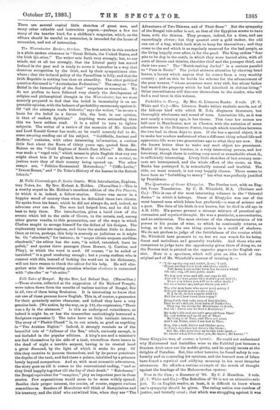The Quatrains of Omar Khay Om. The Persian text, with
an Eng- lish Verse Translation. By C. II. Whinfield, M.A. (Traner and Co.) —This is one of the most intetesting volumes in the "Oriental Series" to which it belongs. Omar al Khayytim was one of the most learned men which Islam has produced,—a man of science and a poet. The date of his birth is not known, but he died in old age in A.D. 1139. His poems present a strange mixture of practical epi- cureanism and mystical thought. Ho was a pantheist, a necessitarian, and an antinomian. The most obvious of the characteristics of his poems is his praise of wine, to which he continually returns, as being, as it were, the one thing certain in a world of shadows. We do not profess to judge of the faithfulness of the version which Mr. Whiufield here presents to us, but we can vouch for its being fluent and melodious, and generally readable. And those who are competent to judge have the opportunity given them of doing so, as the Persian text is printed on the opposite pages to the English ver- sion. Here is a specimen, which will give an idea both of the original and of Mr. Whinfield's manner of treating it :— " T site up thy cup and goblet, Lure,' I said, 'Haunt purling river-b ink and gl.004, chute ;
Full many a moon•luke form has beanie's wheel Oft into cup, oft into goblet made.
We bay new wine and old, oar cups to fill,
And sell for two grains Ors world's gee! and ; Know you where you will go to after death ? Set eke before me, aud go where you will !
Was o'er man born who never went astray ? Did ever mortal pies as oloul day ? If I do Ill, do not requite with ill! Evil for evd bow caust thou repay ?
Bring forth that ruby gem of Bad iklishitn, That he irt's delight, that balm of Turkistda ; They say wrong for Musulmans to drink, But ah ! where can we find a Musulman ?
My body's life and strength proceed from Thee! Iiy coal within and sprit are uf Theo! My being is of Theo, and Then art wine, And I am Thine, since I am lost In Thee.
Min, like a ball, hither and thither goes, As Fate's resiAless bat direcni the blows ; But Be, who gave thee up to this rude sport.- 11c knows what drives thee, yea, He know', He knows.'"
Omar Khayytim was, of course, a heretic. Ile could not understand why Mahommed had forbidden wine to the Faithful just because a drunken Arab once cut his saddle-girths, and he openly sneers at the delights of Paradise. But, like other heretics, he found safety in con- formity and in concealing his opinions, and the learned men of Islam have found a mystical and edifying moaning in his most. irregular utterances. He affords a curious example of the revolt of thought against the bondage of the Idahommedan system.


































 Previous page
Previous page